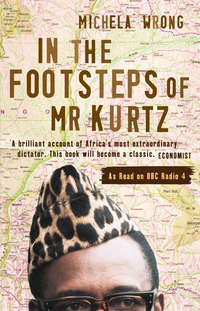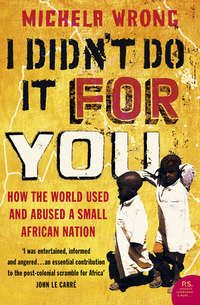
Полная версия
Borderlines
He pursed his lips and gazed at me speculatively, like a tailor measuring his client for a suit. ‘Oh, people with that questing look in their eyes. The Unrooted, I call them. Take it as a compliment. Complacency’s not exactly attractive. Anyway, come along. I’m trying to rustle up an audience. Nothing more embarrassing than talking to an empty room.’ He scribbled the venue and time on the back of a business card, placed it on my table and walked off.
That last bit was one of his little jokes, of course. Winston Peabody III, the first black partner at the Washington firm of Melville & Bart and a celebrity on the human-rights circuit, did not need to beg strangers in hotels to attend his talks. When seats ran out, people would stand. He was one of those speakers adored by the media and envied by academics, who could popularise without dumbing down, rendering dry specialisms so accessible that listeners who had never dreamed of opening a law book found themselves wondering whether they had missed their calling. There are men who seem to change shape, to grow in stature when they climb onto a public platform. Behind a desk, over the phone, Winston was always formidable. On a podium or presenting in court, he became positively sexy, acquiring a town-hall charisma, the spiky, sardonic edge and instinctive timing of the stand-up comedian who knows how to play an audience. Had he wished to at that moment, he could have tapped almost any woman – and a fair number of the men – on the shoulder and they would have considered fucking him a privilege. But in the seconds it took him to step off the stage, he visibly shrank, folding, like an empty Coke can in a weightlifter’s fist, to become just a small, slightly paunchy man in a creased yellow suit whose salt-and-pepper halo of hair could not conceal advanced male-pattern baldness and a tendency to dandruff. Incredible Hulk to mild-mannered Bruce Banner in the blink of an eye.
I honestly can’t remember the details of Winston’s speech, hosted by a human-rights group that had hired a hall on Harvard’s campus for the purpose. Sheer exhaustion had brought matters to a head on the Swiss deal. My skills were not required for the final session with Zurich, and I found myself with a free afternoon. He must have spoken about the hunger for justice in societies emerging from war, how ending the climate of impunity held the key to peace. He probably talked about the debt the West owed developing countries for the horrors of slavery and colonialism and the cynicism of the Cold War. I do recall that he gave some gory examples, anecdotes from visits to East Timor and Cambodia, work done in Colombia and Sierra Leone. Members of the audience gasped at references to stairwells daubed with blood, defence attorneys disembowelled in their offices, human-rights campaigners pulled over on remote country roads and beheaded in the spotlights of their killers’ cars. I saw one girl, long brown hair falling to her waist, close her eyes and lean her head on the shoulder of her boyfriend, who put his arm round her in a manly gesture that signalled: it’s OK, I’m here. What impressed me, though, was not the heartrending stuff, or that Winston spoke in meticulously punctuated sentences – you could actually hear the semi-colons, dashes and quotation marks and when he told his audience: ‘I’ll come back to that point later,’ it wasn’t just a phrase, he really did return, topping and tailing his thought processes like a chef preparing green beans – no, it was the surgical coolness of his eye. This was an impassioned, angry man, but one who never allowed his emotions to interrupt a methodical taking of notes. On his deathbed, as his nearest and dearest gathered to weep, Winston Peabody would be calling, ‘Hush’, the better to analyse the timbre, tone and length of his own death rattle.
At the end, I dutifully took my place in the throng of acolytes gathering around him. Don’t ask me why. I think I wanted him to know I’d bothered. Waiting, I registered that I was a good decade older than the rest.
‘Mr Peabody, I just feel, like, what’s happening is just so awful. What can I do?’ twittered a pigtailed blonde, her cheeks flushed with emotion. She was almost pogoing with enthusiasm, flashing glimpses of a toned stomach and pierced navel. I spotted the gleam of metal in her mouth. Dear God, she was actually wearing braces. This was not the place for me. I turned to leave, but at that moment Winston caught my eye. He reached forward, the human Red Sea somehow parted before him, and placed a restraining hand on my sleeve. ‘Please. Don’t go.’
Fifteen minutes later, the flock of groupies had dispersed and we were in the campus canteen drinking coffee.
He spoke as though picking up an interrupted conversation. ‘So, since 1997 I’ve been working pro bono for the government of North Darrar, in the Horn of Africa. I don’t expect you’ve heard of it?’
‘Well, actually …’
His eyebrows shot up in query.
‘I’ve heard of Darrar, that’s all.’
‘That’s more than most people can say. Good. In many ways North Darrar encapsulates the problems faced by traumatised post-conflict nations. A breakaway state that has just come through the second of two wars with its neighbour and former occupier, and finds itself having to negotiate its border – prove the country’s right to exist, in essence – in The Hague. They’re trying to build a democracy from scratch, but their best people were either killed or fled into exile during the independence struggle so the last thing they need is this kind of international court case. They weren’t rich to start off with – the last war bankrupted them and there’s only so much you can make exporting badly cured hides and potash to the Middle East – and the other side hires the best.’
‘And?’
‘Well, up till now I’ve been fighting this battle virtually single-handed, juggling the job with my paying clients. Melville & Bart help out on the practical side, preparing documents, making our evidence look halfway presentable. But that’s just basic drudgery. We’re reaching a crucial stage. This is complex, sophisticated stuff, and I simply can’t do it alone. I need a deputy. Will you help?’
I blinked. I’d been wondering where the preamble was leading, but it hadn’t occurred to me that this might be its destination. ‘Look, I really don’t understand why you think any of this is my business … Why don’t you get one of your admirers to pitch in? I’m sure one of those kids would jump at the chance.’
He sighed. ‘Sadly, experience proves that the eager intern is more hindrance than help. The first had an attack of the runs, decided he’d caught cholera and insisted on being medevaced out. The second went mountain biking, hit a camel and broke her wrist – no more typing. I can’t play nanny – I’m temperamentally unsuited to it. I spend all my free time in Lira, but I need someone based there to keep the show on the road during my necessary absences. Are you interested?’ He was spooning sugar into his cappuccino as though determined not to acknowledge my disbelieving eyes.
‘This is nuts. We’ve barely met. You don’t know anything about me.’
‘Well, I know what I saw in your face the other day. I’ve rarely seen a bleaker expression. And actually,’ he took a slurp and shot me a look over the cup’s rim, ‘I know slightly more than you think. As I said, Dan and I go way back. He briefed me on your, er, personal circumstances over lunch a few months ago. I knew we’d bump into each other one of these days. Dan suggested Grobart & Fitchum was no longer the right place for you. Oh, he had nothing but praise for the quality of your work but he thinks you’d do better – be happier – elsewhere.’
I flushed. ‘How very considerate of him.’
There was a pause. He took another slurp and said slowly, ‘My own policy is to welcome kindness when I see it, however clumsy or awkward a form it takes. It’s a rare commodity, especially in our profession.’
I looked away, my eyes pricking. ‘I think I heard you use the phrase “pro bono”. I need to eat. Grobart & Fitchum pay extremely well. My savings account looks pretty healthy these days.’
‘Well,’ he leaned forward to hold my gaze with those sorrowful, honey-coloured eyes, ‘your savings account may look healthy, but you certainly don’t. In any case, you’d get a decent salary. The North Darrar government can afford to pay one international lawyer’s stipend – I’ve persuaded them they have to. It took some doing, believe me.’
I was beginning to feel cornered. I’d met this man only two days ago, and already he had arrogated a say over my future. It was absurd. ‘You said this was a border case? That’s totally out of my area of expertise. I do corporate law.’
‘Nothing you can’t handle, believe me. Dan assures me you’re one of the smartest lawyers he’s ever employed. I’ll hold your hand, and they do say that I’m a born teacher. I notice you wrote your thesis on –’ he took out a card ‘– “Challenges of peace: when former Latin American guerrilla organisations turn law-makers”. So it seems you already have some interest in the developing world.’
Ah, yes, my thesis. An eccentric pimple on the bland epidermis of an otherwise unremarkable post-graduate degree. Fuelled by the sheer lust I’d harboured towards Gavin, the sole Caribbean student on our LSE course and the only one who brought books by Chomsky and Che Guevara into lectures. A sudden mental image. Gavin dashing into the sea one miraculously mild October weekend in Dorset. A dark Michelangelo’s David, nipples erect in the chill, pulling off a pair of jeans as I watched from the shingle. I’d wanted to impress him, hence the thesis; its drafting had outlasted the relationship.
‘Regard this as the equivalent of a further degree in international law, prepared under expert guidance,’ Winston continued. ‘I’ll be expecting you to do some of the presentations, so you’ll get priceless experience. I know lawyers in their mid-forties who are still waiting for their law firm to grant them permission to stand up in a courtroom and argue a case. They’re not even halfway up a chain twenty links deep. Put in a few years and you’ll come out of this with a whole new skill set. All courtesy of the North Darrar government. I’d call that a pretty attractive offer.’
I sat in silence, surprised I had allowed the conversation to go on as long as it had.
Winston picked up his briefcase and turned his head slowly from side to side, uncricking a stiff neck and carrying out a panoramic survey of the café, with its gaggles of chatting students, the odd loner hunched over a laptop and a muffin. He was considering what form to give his closing remarks. Had he chosen the bombastic – anything on the lines of ‘doing something worthwhile with your life’, or ‘helping millions of poor Africans who never had your chances’ – I would have slipped off his gleaming hook, like a sliver of jelly off a fork, consigning the whole episode to the surreal-encounter-best-ignored category as swiftly as I left campus.
‘Look, Paula. One of the great satisfactions I’ve discovered, working in Africa, is being able to have a disproportionate impact per hour of effort put in. Call it big-fish-small-pond syndrome, call it stroking my own ego, whatever. I’m not, despite appearances, the world’s brightest lawyer. But there is – and I’m not boasting here, just stating the facts – no one in that entire country who has my skills. They’ve been fighting for nearly three decades, they know how to repair Kalashnikovs and make a handful of lentils and a gourd of water last a week. They’re confident they can build a socialist Utopia, but they can’t do this. And I can. I cannot describe to you the professional satisfaction that brings. You may never experience it anywhere else ever again.’
It was a deft, manipulative appeal. But I was ready to be manipulated, pining to be told what to do. I was so tired of being master of my fate.
We met on the ice.
A woman on the cusp of thirty, with a muss of brown hair, sits on a bench by the side of the Rockefeller Center Ice Rink in New York in mid-February 1999. Having laced up her hired skates, she stands with wobbly care. It’s been a long time since she had these on, but she is determined to see this through. Hitchens, the firm where she works as a transactional lawyer, crossing the legal t’s and dotting the i’s on bond deals, overlooks the sunken rink and she has been watching the skaters from her office window for weeks, envying their fluid grace.
These two, though, she does not envy. They are graceless and comic. A bearded, middle-aged man in grey jeans and a lumberjack shirt, flailing and juddering on his skates, and a ponytailed brunette, all white cleavage and heavy eye-liner, draped, giggling, on one arm. Her eyes skim over them – she assumes they’re a couple. The buxom girl must be wife number two or three. Only she is not going to be allowed to ignore them. Because just as she ventures warily onto the ice the two career towards her. There is a loud scream, the girl falls, showing even more of that milky cleavage and still laughing, and the woman is knocked violently back. Her skates slide out from under her and she finds herself half lying, half sitting on the ice with the man sprawled on top. For a split-second, his eyes, grey-blue, are locked on hers. As, arms flailing, he attempts to right himself – ‘God, I’m so sorry’ – he briefly places a hand on her left breast.
‘Straight for my tits. What a lech,’ she will chide him later on. The episode is something they both enjoy examining, returning to.
‘Only way of getting your attention,’ he will reply, looking absurdly pleased with himself. And then he will usually kiss the top of her head as you might a child’s.
‘The custom, where I come from, is to shake hands,’ is what she says at the time. On his second attempt to get up, the man is careful to place his hand on the ice for leverage. His hands are the most atypical thing about him, she will come to know. They are a peasant’s hands, stubby-fingered and as wide as paddles.
‘Oh, I believe in cutting to the chase,’ he replies, then apologises again. And she later finds out that this is not a joke. Just as she has been watching the skaters, admiring their grace, he has been watching her, noting her daily routine, plucking up the courage to introduce himself. He works in the same building.
They both stand up – she will sport large bruises on her buttocks for weeks. Names are exchanged, the girl, slapping ice dust off her trousers, is introduced. She is Sophie, his younger daughter. So he is older than he looks. Her accent is remarked upon and she gives her usual trite explanation of how a junior British lawyer ends up on Wall Street. Then he gestures to where a figure wrapped in a cashmere scarf, fur hat and gloves stands on the far side of the rink, near the gilded statue of Prometheus, a chilled silhouette radiating boredom. Two glossy pedigree dogs pull impatiently at their leads. ‘My wife is waiting. And so are Laurel and Hardy. We’d better go. Till the next time.’
A wife, she notes. Why bother with ‘till the next time’? But she will bump into him later, in the ground-floor café of their building. She will discover that he works for a respected firm of architects, then that he not only set up the firm but has a claim on the entire building in which she works. Jake Wentworth is, in a minor way, a local celebrity, the well-liked unpretentious scion of a WASP family that made its fortune hurling railroads across the United States. One day he will inherit the family fortune, but in the meantime he is doing the job he loves, juggling draughtsmanship with a regular arts column and the directorship of a charity for political asylum seekers, funded by Wentworth money. She will meet him on the ice again, alone this time, and neither will get any skating done. Instead, they will talk about politics, discuss the Coen brothers’ latest film, and he will give her a witty-yet-not-unkind potted résumé of twenty years’ New York high society gossip, for these are circles to which his name grants entry. They will both be surprised to find that it feels like a conversation between old friends after a long break, rather than a first exchange between strangers. And soon she will discover, thanks to a personal assistant’s indiscretions, that the impatience she glimpsed in the female figure by the skating rink extends further than irritation at the cold: there are independent bank accounts, solo holidays, separate bedrooms. And the young woman will find herself hoovering up office tittle-tattle with unbecoming greed.
He has made contact. He has made her care.
Конец ознакомительного фрагмента.
Текст предоставлен ООО «ЛитРес».
Прочитайте эту книгу целиком, купив полную легальную версию на ЛитРес.
Безопасно оплатить книгу можно банковской картой Visa, MasterCard, Maestro, со счета мобильного телефона, с платежного терминала, в салоне МТС или Связной, через PayPal, WebMoney, Яндекс.Деньги, QIWI Кошелек, бонусными картами или другим удобным Вам способом.





